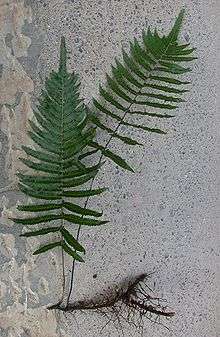Thelypteris
| Thelypteris | |
|---|---|
 | |
| Thelypteris acuminata | |
| Scientific classification | |
| Kingdom: | Plantae |
| Division: | Polypodiophyta |
| Class: | Polypodiopsida |
| Order: | Polypodiales |
| (unranked): | Eupolypods II |
| Family: | Thelypteridaceae |
| Genus: | Thelypteris Schmidel 1763 |
| Species | |
|
as many as 900; see text | |
Thelypteris (maiden ferns)[1] is a genus of ferns in the family Thelypteridaceae, order Polypodiales.[2] If the genus is defined fairly broadly, it contains 875[3] species, many of which are extremely similar to one another, and is found nearly worldwide.[3] The ferns are terrestrial, with the exception of a few which are lithophytes (grow on rocks).[4] The bulk of the species are tropical, although there are a number of temperate species.[4]
The genus name is from Greek thēlys "female" and pteris "fern". However, "female fern" usually refers to the common lady-fern.
Classification
At one time, all thelypterioid ferns were included in the genus Dryopteris because of the sorus shape. However, there are a great many differences between the groups, and these plants are now segregated in their own family.
Some researchers include the entire family Thelypteridaceae in the genus Thelypteris; others divide the family into as many as 30 genera. An intermediate position is to place the bulk in Thelypteris (which can then be divided into subgenera and sections corresponding to the genera of other authors) but to separate out Phegopteris and Macrothelypteris.[3] Another choice is to divide the family into a half a dozen or so genera, one of which is Thelypteris.[4]
Species
The genus includes the following species (incomplete list):
- Thelypteris aculeata, A.R.Sm., endemic to Ecuador
- Thelypteris appressa, A.R.Sm., endemic to Ecuador
- Thelypteris bonapartii, (Rosenst.) Alston, endemic to Ecuador
- Thelypteris campii, A.R.Sm., endemic to Ecuador
- Thelypteris chimboracensis, A.R.Sm., endemic to Ecuador
- Thelypteris conformis, (Sodiro) A.R.Sm., endemic to Ecuador
- Thelypteris correllii, A.R.Sm., endemic to Ecuador
- Thelypteris dodsonii, A.R.Sm., endemic to Ecuador
- Thelypteris elegantula, (Sodiro) Alston, endemic to Ecuador
- Thelypteris euthythrix, A.R.Sm., endemic to Ecuador
- Thelypteris fluminalis, A.R.Sm., endemic to Ecuador
- Thelypteris inabonensis, Proctor, Puerto Rico
- Thelypteris kunthii (Desv.) Morton (=T. normalis), southeastern United States
- Thelypteris macra, A.R.Sm., endemic to Ecuador
- Thelypteris nevadensis (Baker) Clute ex Morton, western North America
- Thelypteris noveboracensis (L.) Nieuwl., New York fern, eastern North America[5]
- Thelypteris palustris Schott, eastern marsh fern, eastern North America
- Thelypteris pilosa, (M. Martens & Galeotti) Crawford, Mexico, Central America, Alabama
- Thelypteris puberula (Baker) Morton, Mexico, southwestern US
- Thelypteris rosenstockii, (C.Chr.) R.M.Tryon, endemic to Ecuador
- Thelypteris semilunata, (Sodiro) A.R.Sm., endemic to Ecuador
- Thelypteris simulata, (Davenport) Nieuwl., Bog fern, Massachusetts fern, eastern North America[6]
- Thelypteris subtilis, A.R.Sm., endemic to Ecuador
- Thelypteris verecunda, Proctor, Puerto Rico
- Thelypteris yaucoensis, Proctor, Puerto Rico
The flavonoid Protoapigenone from Thelypteris torresiana (a native fern in Taiwan) is being studied in order to better understand the Epstein-Barr virus[7] and may have potential in treating ovarian cancer.[8]
References
- ↑ "Thelypteris". Natural Resources Conservation Service PLANTS Database. USDA. Retrieved 9 December 2015.
- ↑ Christenhusz, Maarten J. M.; Zhang, Xian-Chun; Schneider, Harald (2011). "A linear sequence of extant families and genera of lycophytes and ferns" (PDF). Phytotaxa. 19: 7–54.
- 1 2 3 "Thelypteris". Flora of North America.
- 1 2 3 Smith, Alan R.; Pryer, Kathleen M.; Schuettpelz, Eric; Korall, Petra; Schneider, Harald; Wolf, Paul G. (August 2006). "A Classification for Extant Ferns". Taxon. 55 (3): 705–31. JSTOR 25065646.
- ↑ "Thelypteris noveboracensis". Flora of North America.
- ↑ "Thelypteris simulata". LBJ Wildflower Center Native Plant Database.
- ↑ Tung, Chao-Ping; Chang, Fang-Rong; Wu, Yang-Chang; Chuang, Da-Wei; Hunyadi, Attila; Liu, Shih-Tung (2011). "Inhibition of the Epstein-Barr virus lytic cycle by protoapigenone". Journal of General Virology. 92 (8): 1760–8. doi:10.1099/vir.0.031609-0. PMID 21490247.
- ↑ Chang, Hsueh-Ling; Su, Jinu-Huang; Yeh, Yao-Tsung; Lee, Yi-Chen; Chen, Huey-Ma; Wu, Yang-Chang; Yuan, Shyng-Shiou F. (2008). "Protoapigenone, a novel flavonoid, inhibits ovarian cancer cell growth in vitro and in vivo". Cancer Letters. 267 (1): 85–9. doi:10.1016/j.canlet.2008.03.007. PMID 18430509.